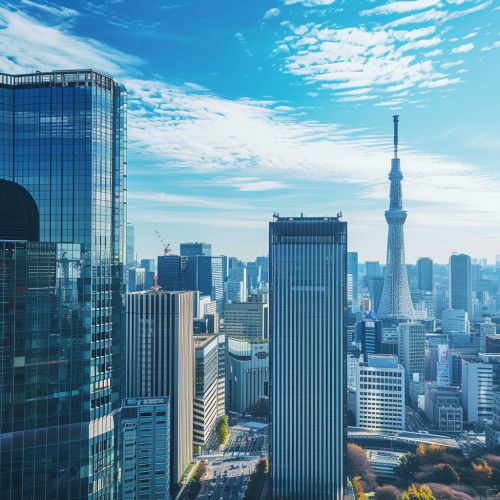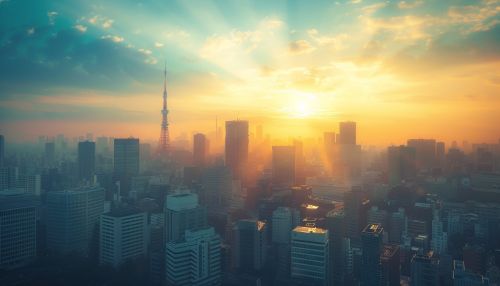Economy of Tokyo
Economy of Tokyo
The economy of Tokyo, the capital city of Japan, is one of the most developed and complex urban economies in the world. As a major international finance center, Tokyo plays a pivotal role in the global economy. This article delves into the various aspects of Tokyo's economy, including its financial sector, industries, commerce, and infrastructure.
Financial Sector
Tokyo is home to the Tokyo Stock Exchange (TSE), one of the largest stock exchanges in the world by market capitalization. The TSE lists many of Japan's largest companies, including multinational corporations such as Toyota, Sony, and Mitsubishi. The financial district of Marunouchi, located near Tokyo Station, is a hub for banking and finance, hosting the headquarters of major banks like Mitsubishi UFJ Financial Group and Mizuho Financial Group.


The Bank of Japan, the country's central bank, is also headquartered in Tokyo. It plays a crucial role in monetary policy, including setting interest rates and regulating the money supply. The presence of numerous foreign banks and financial institutions further enhances Tokyo's status as a global financial center.
Industries
Tokyo's economy is diverse, with significant contributions from various industries. The city is a major center for manufacturing, particularly in high-tech and precision industries. Companies like Canon, Toshiba, and Hitachi have their headquarters in Tokyo and are leaders in electronics and technology.
The automotive industry is another vital sector, with Tokyo serving as the headquarters for giants like Honda and Nissan. These companies are involved in the design, manufacturing, and export of vehicles and automotive parts, contributing significantly to both the local and national economy.
Commerce
Tokyo is a major commercial hub, with a vast array of retail and wholesale businesses. The city boasts numerous shopping districts, such as Ginza, Shibuya, and Shinjuku, which attract both domestic and international shoppers. These districts are known for their luxury boutiques, department stores, and electronic shops.
The wholesale market is also substantial, with the Tsukiji Market (now relocated to Toyosu) being one of the largest fish markets in the world. The market handles thousands of tons of seafood daily, supplying restaurants and retailers across the city and beyond.
Infrastructure
Tokyo's infrastructure is highly developed, supporting its economic activities. The city's transportation network includes extensive rail and subway systems, operated by companies like JR East and Tokyo Metro. These systems are known for their efficiency and punctuality, facilitating the movement of millions of people daily.
The Port of Tokyo is one of the busiest seaports in Japan, handling a significant volume of cargo. It is a crucial gateway for imports and exports, supporting Tokyo's role as a commercial center. Additionally, Tokyo is served by two major airports: Narita International Airport and Haneda Airport, both of which handle a large number of international and domestic flights.
Real Estate
Real estate in Tokyo is among the most expensive in the world. The city's limited land area and high demand for residential and commercial space drive up property prices. Areas like Roppongi, Aoyama, and Omotesando are known for their high-end real estate, attracting wealthy individuals and businesses.
The commercial real estate market is also robust, with numerous office buildings and skyscrapers in districts like Shinjuku and Marunouchi. These areas are home to many multinational corporations and financial institutions, contributing to the high demand for office space.
Technology and Innovation
Tokyo is a leading center for technology and innovation. The city is home to numerous research and development facilities, universities, and tech startups. Akihabara, known as "Electric Town," is a famous district for electronics and technology enthusiasts, offering a wide range of gadgets and components.
The city's government actively supports innovation through initiatives like the Tokyo Metropolitan Government's "Innovation Tokyo" program, which aims to foster a startup ecosystem and promote technological advancements.
Tourism
Tourism is a significant contributor to Tokyo's economy. The city attracts millions of visitors annually, drawn by its cultural landmarks, shopping districts, and entertainment options. Popular tourist attractions include the Tokyo Skytree, Senso-ji Temple, and the Imperial Palace.
The hospitality industry, including hotels, restaurants, and travel services, benefits greatly from the influx of tourists. Major events like the Tokyo Marathon and various festivals also boost the local economy by attracting international participants and spectators.
Challenges and Future Prospects
Despite its economic strengths, Tokyo faces several challenges. The city's aging population and declining birth rate pose long-term demographic issues that could impact the labor force and economic growth. Additionally, Tokyo must address environmental concerns, such as air pollution and waste management, to ensure sustainable development.
However, Tokyo's economy remains resilient, with ongoing investments in infrastructure, technology, and innovation. The city's strategic location, skilled workforce, and robust financial sector position it well for continued economic success.
